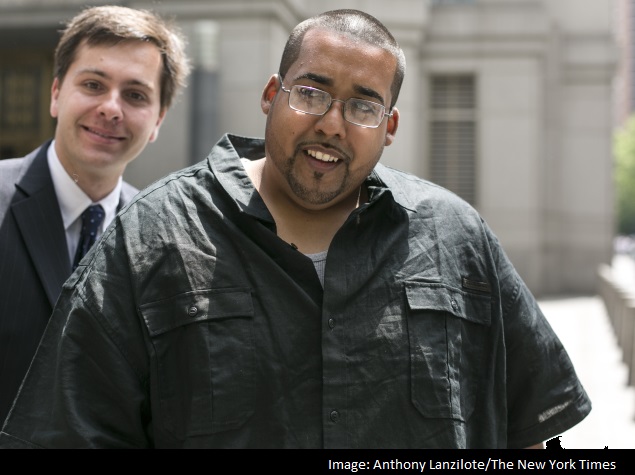- Home
- Internet
- Internet News
- Hacker Who Disrupted Hundreds of Cyberattacks Is Allowed to Walk Free
Hacker Who Disrupted Hundreds of Cyberattacks Is Allowed to Walk Free

Federal prosecutors had sought leniency for the hacker, Hector Xavier Monsegur, citing his efforts in helping the Federal Bureau of Investigation take down an aggressive group of hackers who were part of the collective Anonymous, with which Monsegur had been involved, and its splinter groups, which had taken credit for attacking government and corporate websites.
(Also see: Hacker Helped Government Thwart 300 Cyberattacks: US Prosecutors)
Monsegur's information, the authorities said, led to the arrest of eight "major co-conspirators," including Jeremy Hammond, whom the FBI had called its top "cybercriminal target" and who was sentenced to 10 years in prison in November.
The judge, Loretta A. Preska of U.S. District Court, sentenced Monsegur to time already served, calling his cooperation "truly extraordinary"; he had spent seven months in custody in 2012.
"You obviously have great skill," Preska told Monsegur, who used the Internet alias Sabu. "To deploy that skill for good would be a very good thing.
"You have done as much as any human being can do in terms of helping the government to make up for your past wrongs and to avert other damage to probably millions of people," she added. "So, I salute you for that."
The advisory federal sentencing guidelines had called for a term of roughly 21 to 26 years, although the office of Preet Bharara, the U.S. attorney for the Southern District of New York, had asked that he receive a substantially lower sentence.
"Through his cooperation, we averted untold millions of dollars in loss to victims," a prosecutor, James J. Pastore Jr., told the judge. "We also averted potential really catastrophic problems with critical infrastructure."
Preska cited "the immediacy of Mr. Monsegur's cooperation and its around-the-clock nature."
Monsegur agreed to cooperate immediately upon being confronted by agents in June 2011, prosecutors have said.
At the time of his arrest, Monsegur was serving as a foster parent for two young female cousins; his federal public defenders, Peggy Cross-Goldenberg and Philip L. Weinstein, said in court papers that their client's decision to cooperate had not been a difficult one.
"His family came first," the lawyers wrote. "He would do whatever he had to do to protect the girls and avoid their placement in the foster care system."
Preska noted that Monsegur and his family had been subjected to threats after his role as a cooperator became known in March 2012. As prosecutors have said in court papers, he had been vilified online by supporters of Anonymous and was repeatedly "approached on the street and threatened or menaced about his cooperation."
The authorities were so concerned about his safety that they relocated Monsegur and certain members of his family, prosecutors have said. "He despairs when he thinks of what he put his family through," Cross-Goldenberg said in court.
Monsegur, 30, who, as a youth, lived in the Jacob Riis housing project on the Lower East Side of Manhattan, pleaded guilty before Preska in August 2011 to 12 counts of hacking conspiracy and other charges. He was released on bail, but his bail was revoked in May 2012 after he made "unauthorized online postings," the government has said.
He served seven months in custody and was again released on bail in December 2012. While detained at the Metropolitan Correctional Center, he developed and taught a computer-skills course, Cross-Goldenberg told the judge.
In court, Monsegur told the judge that in the past three years, he had "gone through a lot of changes, learned a lot of lessons."
"I assure you, I will not be in this courtroom ever again," he added. "I'm not the same person you saw three years ago. I'm ready to move on."
As part of the sentence, the judge imposed a one-year period of supervised release, including what she called "a computer monitoring program."
After the hearing, Weinstein said that his client was now looking for a good job.
"He has a skill set that is very unique," Weinstein said. "He schooled the agents on things they didn't know about."
© 2014 New York Times News Service
For details of the latest launches and news from Samsung, Xiaomi, Realme, OnePlus, Oppo and other companies at the Mobile World Congress in Barcelona, visit our MWC 2026 hub.
Related Stories
- Samsung Galaxy Unpacked 2026
- iPhone 17 Pro Max
- ChatGPT
- iOS 26
- Laptop Under 50000
- Smartwatch Under 10000
- Apple Vision Pro
- Oneplus 12
- OnePlus Nord CE 3 Lite 5G
- iPhone 13
- Xiaomi 14 Pro
- Oppo Find N3
- Tecno Spark Go (2023)
- Realme V30
- Best Phones Under 25000
- Samsung Galaxy S24 Series
- Cryptocurrency
- iQoo 12
- Samsung Galaxy S24 Ultra
- Giottus
- Samsung Galaxy Z Flip 5
- Apple 'Scary Fast'
- Housefull 5
- GoPro Hero 12 Black Review
- Invincible Season 2
- JioGlass
- HD Ready TV
- Latest Mobile Phones
- Compare Phones
- Apple iPhone 17e
- AI+ Pulse 2
- Motorola Razr Fold
- Honor Magic V6
- Leica Leitzphone
- Samsung Galaxy S26+
- Samsung Galaxy S26 Ultra
- Samsung Galaxy S26
- MacBook Pro 16-Inch (M5 Max, 2026)
- MacBook Pro 16-Inch (M5 Pro, 2026)
- Apple iPad Air 13-Inch (2026) Wi-Fi + Cellular
- Apple iPad Air 13-Inch (2026) Wi-Fi
- Huawei Watch GT Runner 2
- Amazfit Active 3 Premium
- Xiaomi QLED TV X Pro 75
- Haier H5E Series
- Asus ROG Ally
- Nintendo Switch Lite
- Haier 1.6 Ton 5 Star Inverter Split AC (HSU19G-MZAID5BN-INV)
- Haier 1.6 Ton 5 Star Inverter Split AC (HSU19G-MZAIM5BN-INV)

















